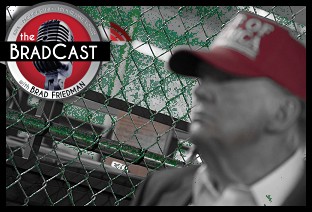Guest blogged by Ernest A. Canning
 In Wisconsin, two Dane County Circuit Court judges, David Flanagan and Richard Niess both issued injunctions against the state GOP's polling place photo ID restriction ("Act 23") --- Flanagan's temporary, Niess' permanent --- after finding that the law was in direct violation of the WI state constitution's guaranteed right to vote.
In Wisconsin, two Dane County Circuit Court judges, David Flanagan and Richard Niess both issued injunctions against the state GOP's polling place photo ID restriction ("Act 23") --- Flanagan's temporary, Niess' permanent --- after finding that the law was in direct violation of the WI state constitution's guaranteed right to vote.
Immediately after the first of those two injunctions, issued by Judge Flanagan in Milwaukee Branch of the NAACP v. Walker, the WI GOP filed an ethics complaint with the WI Judicial Commission, alleging that the judge had violated the WI Code of Judicial Conduct because he had signed a petition to recall Gov. Scott Walker (R) and failed to disclose that fact before issuing his ruling.
However, when Flanagan's temporary injunction was promptly followed not only by Neiss' permanent injunction one week later, but by a subsequent refusal by an intermediate WI appellate court to stay the temporary injunction, the hard-right, operating under another right-wing billionaire front group, the Landmark Legal Foundation, filed ethics complaints against 29 WI judges who also signed recall petitions.
If you can't beat 'em, hit 'em with ethics violations complaints...
No ethical violation in recall signatures
While there is a legitimate question as to whether Judge Flanagan should have revealed his recall signature prior to issuing the injunction, the hard-right claim that a judge cannot sign a recall petition is specious, yet consistent with the 50-year plutocratic assault on the rule of law via court packing, the details of which we discussed in "Citizens United: A Case Which Will Live in Infamy", one of our first responses to that ignominious 2010 ruling by the U.S. Supreme Court.
While the WI Code of Judicial Conduct prevents judges from endorsing political candidates, it does not prevent them from voting.
As observed by Marquette University Law Prof. Janine P. Geske --- who had served on the WI Supreme Court from 1993 - 1998, before she was succeeded by the controversial rightwing Justice David Prosser --- the signing of a recall petition is somewhere between voting and endorsing. In the case of Judge Flanagan, she says, she has no problem with his signing the recall petition because when he did, he had "no reason to know [that he] would end up on [the photo ID] case."
The WI Code of Judicial Conduct does not say that a judge cannot vote or that it would be improper to sign a recall petition. Monroe County Judge J. David Rice, who signed a recall petition himself, states that he did so only after Jim Alexander, the executive director of the WI Judicial Commission, informed him that doing so would not violate the code.
In that regard, the WI Code of Judicial Conduct appears analogous to the rules governing the conduct of federal judges. Those rules note: "Complete separation of a judge from extrajudicial activities is neither possible nor wise; a judge should not become isolated from the society in which the judge lives."
In Republican Party of Minnesota v. White (2002), the GOP argued, and the GOP-appointed majority on the U.S. Supreme Court agreed, that the MN "Supreme Court's canon of judicial conduct prohibiting candidates for judicial election from announcing their views on disputed legal and political issues [violated] the First Amendment" rights of those seeking judicial office.
One one hand, the WI GOP is outraged enough to file an ethics complaint against a judge who signed a petition to recall a politician who arguably threatens the very efficacy of the constitution the judge has sworn to uphold.
On the other, the same WI GOP trumpeted their support for WI Supreme Court Justice David Prosser as he signaled his intent, during his re-election bid last year, to facilitate the Walker administration's political agenda by promising to advance "conservative values" from the bench.
But then, perhaps today's WI GOP believes that the rights afforded by the First Amendment, as affirmed in the 2002 U.S. Supreme Court case, only apply to Republicans.
The effort to muddy the legal waters
It is true that Judge Flanagan did not disclose the fact that he signed the recall petition before he issued his temporary injunction against the state's new Republican-enacted restrictions on voting rights. But then, Judge Flanagan may have regarded the signing of a recall petition no more relevant to his decision than would be the question of who he voted for in the 2010 gubernatorial election.
Unless Walker and his fellow Republicans are ready to concede that the purpose of voter photo ID legislation is to illegally suppress the Democratic vote, then there is no real conflict which would have mandated disclosure.
The timing of the GOP ethics complaint against Judge Flanagan, coming immediately upon the heels of the injunction, is also exceedingly suspect. It is difficult to believe that the GOP (and the Republican state Attorney General) did not discover Judge Flanagan's recall signature until after his preliminary injunction was issued. If they did know before-hand, and really believed it significant, why didn't WI Attorney General J.B. Van Hollen raise the issue before the injunction was issued, so that Judge Flanagan could immediately determine whether a recusal was warranted?
Former Justice Geske, who does not suggest that Judge Flanagan violated the code, suggested that matters "could get messier" because Judge Flanagan did not disclose his recall signature before issuing his ruling. However, any effort to muddy the legal waters surrounding Judge Flanagan's photo ID ruling was thwarted by the subsequent permanent injunction --- on similar constitutional grounds --- issued by Judge Niess in a completely separate challenge to the law, and then again by the refusal of the state's intermediate appellate court to issue a stay on Flanagan's ruling.
The ethics complaint against 29 WI judges was filed after both of those decisions.
Consider the source
As argued in our two-part coverage (here and here) of last September's U.S. Senate committee hearings on the new GOP voter suppression laws across the country, hard-right American billionaires, like the Koch brothers, operating through front groups like the Paul Weyrich co-founded American Legislative Exchange Council (ALEC), seek nothing less than to dismantle our constitutional, representative form of democracy and to replace it with an autocratic and plutocratic, corporate security state.
ALEC has undertaken to pervert and corrupt the legislative process by bringing together corporate lobbyists with the best politicians only corporate money can buy. As Media Matters details, ALEC drafts up to 1,000 bills ("ALEC Model Legislation") to be introduced by their political operatives (aka elected state legislators).
"An average of 20 percent become law," Media Matters reports. These bills have included ALEC models designed to impede the right to register to vote, to cast a vote and to have votes accurately counted. They have also included the union-busting legislation which was signed into law by WI Gov. Scott Walker.
As revealed by PR Watch, ALEC is bankrolled by some of the worlds largest corporations, including Exxon-Mobil, and corporate "foundations," like the "Charles G. Koch Charitable Foundation."
It comes as little surprise then, that the so-called "Landmark Legal Foundation," which lodged the ethics complaint against the 29 WI jurists, has been funded by the likes of Exxon-Mobil and the Charles G. Koch Charitable Foundation. Same funders, different front group.
Landmark's President, far right-wing talk radio host Mark Levin, has compared "President Obama to Hitler and referred to the National Organization for Women as the 'National Organization of Really Ugly Women.'"
Levin's colleague, the embattled Rush Limbaugh, is also an unpaid member of Landmark's advisory board.
It is that font of ethical virtue then, which has suddenly become concerned with the (small "d') democratic preferences of 29 sitting Wisconsin judges and which has figured out how to package their hypocritical "outrage" for their easily duped followers as "judicial ethics complaints".
The War for Wisconsin continues.
Ernest A. Canning has been an active member of the California state bar since 1977. Mr. Canning has received both undergraduate and graduate degrees in political science as well as a juris doctor. He is also a Vietnam vet (4th Infantry, Central Highlands 1968). Follow him on Twitter: @Cann4ing.


 'Green News Report' 7/15/25
'Green News Report' 7/15/25
 Repub Support for Immigrants Skyrockets Amid Trump's Crackdown: 'BradCast' 7/14/25
Repub Support for Immigrants Skyrockets Amid Trump's Crackdown: 'BradCast' 7/14/25  Sunday 'Totally Predictable' Toons
Sunday 'Totally Predictable' Toons Democracy STILL Our Best Way Out of This Mess -- And Repubs Know It: 'BradCast' 7/10/25
Democracy STILL Our Best Way Out of This Mess -- And Repubs Know It: 'BradCast' 7/10/25 'Green News Report' 7/10/25
'Green News Report' 7/10/25 'Mass Shooter Subsidy'?: More Dumb, Deadly Stuff in Trump's New Law: 'BradCast' 7/9/25
'Mass Shooter Subsidy'?: More Dumb, Deadly Stuff in Trump's New Law: 'BradCast' 7/9/25  Trump's New Law Supersizes ICE, Mass Detention, Militarization: 'BradCast' 7/8/25
Trump's New Law Supersizes ICE, Mass Detention, Militarization: 'BradCast' 7/8/25  'Green News Report' 7/8/25
'Green News Report' 7/8/25 Texas Flooding Tragedy Was Both Predictable and Predicted: 'BradCast' 7/7/25
Texas Flooding Tragedy Was Both Predictable and Predicted: 'BradCast' 7/7/25 Sunday 'Big Billionaire Bonanza' Toons
Sunday 'Big Billionaire Bonanza' Toons Sunday 'Total Obliteration' Toons
Sunday 'Total Obliteration' Toons 'Green News Report' 6/26/25
'Green News Report' 6/26/25 Thank You For Your Attention to This Matter:
Thank You For Your Attention to This Matter: Mamdani Primary 'Win' Augurs New Era of Rising Progressives: 'BradCast' 6/25/25
Mamdani Primary 'Win' Augurs New Era of Rising Progressives: 'BradCast' 6/25/25 U.S. Authoritarianism Under-way (But We're Still Here to Fight It): 'BradCast' 6/24/25
U.S. Authoritarianism Under-way (But We're Still Here to Fight It): 'BradCast' 6/24/25 'Anti-War' Trump Attacks Iran on False Claims About WMD: 'BradCast' 6/23/25
'Anti-War' Trump Attacks Iran on False Claims About WMD: 'BradCast' 6/23/25 Senate Health Care Cuts 'More Extreme' Than House Version: 'BradCast' 6/19/25
Senate Health Care Cuts 'More Extreme' Than House Version: 'BradCast' 6/19/25 What 'Anti-War President'? MAGA Civil War Over Trump, Iran: 'BradCast' 6/18/25
What 'Anti-War President'? MAGA Civil War Over Trump, Iran: 'BradCast' 6/18/25 Trump's 'Remigration' is Code for 'Ethnic Cleansing': 'BradCast' 6/17/25
Trump's 'Remigration' is Code for 'Ethnic Cleansing': 'BradCast' 6/17/25 Last Weekend Today: 'BradCast' 6/16/25
Last Weekend Today: 'BradCast' 6/16/25
 VA GOP VOTER REG FRAUDSTER OFF HOOK
VA GOP VOTER REG FRAUDSTER OFF HOOK Criminal GOP Voter Registration Fraud Probe Expanding in VA
Criminal GOP Voter Registration Fraud Probe Expanding in VA DOJ PROBE SOUGHT AFTER VA ARREST
DOJ PROBE SOUGHT AFTER VA ARREST Arrest in VA: GOP Voter Reg Scandal Widens
Arrest in VA: GOP Voter Reg Scandal Widens ALL TOGETHER: ROVE, SPROUL, KOCHS, RNC
ALL TOGETHER: ROVE, SPROUL, KOCHS, RNC LATimes: RNC's 'Fired' Sproul Working for Repubs in 'as Many as 30 States'
LATimes: RNC's 'Fired' Sproul Working for Repubs in 'as Many as 30 States' 'Fired' Sproul Group 'Cloned', Still Working for Republicans in At Least 10 States
'Fired' Sproul Group 'Cloned', Still Working for Republicans in At Least 10 States FINALLY: FOX ON GOP REG FRAUD SCANDAL
FINALLY: FOX ON GOP REG FRAUD SCANDAL COLORADO FOLLOWS FLORIDA WITH GOP CRIMINAL INVESTIGATION
COLORADO FOLLOWS FLORIDA WITH GOP CRIMINAL INVESTIGATION CRIMINAL PROBE LAUNCHED INTO GOP VOTER REGISTRATION FRAUD SCANDAL IN FL
CRIMINAL PROBE LAUNCHED INTO GOP VOTER REGISTRATION FRAUD SCANDAL IN FL Brad Breaks PA Photo ID & GOP Registration Fraud Scandal News on Hartmann TV
Brad Breaks PA Photo ID & GOP Registration Fraud Scandal News on Hartmann TV  CAUGHT ON TAPE: COORDINATED NATIONWIDE GOP VOTER REG SCAM
CAUGHT ON TAPE: COORDINATED NATIONWIDE GOP VOTER REG SCAM CRIMINAL ELECTION FRAUD COMPLAINT FILED AGAINST GOP 'FRAUD' FIRM
CRIMINAL ELECTION FRAUD COMPLAINT FILED AGAINST GOP 'FRAUD' FIRM RICK SCOTT GETS ROLLED IN GOP REGISTRATION FRAUD SCANDAL
RICK SCOTT GETS ROLLED IN GOP REGISTRATION FRAUD SCANDAL VIDEO: Brad Breaks GOP Reg Fraud Scandal on Hartmann TV
VIDEO: Brad Breaks GOP Reg Fraud Scandal on Hartmann TV RNC FIRES NATIONAL VOTER REGISTRATION FIRM FOR FRAUD
RNC FIRES NATIONAL VOTER REGISTRATION FIRM FOR FRAUD EXCLUSIVE: Intvw w/ FL Official Who First Discovered GOP Reg Fraud
EXCLUSIVE: Intvw w/ FL Official Who First Discovered GOP Reg Fraud GOP REGISTRATION FRAUD FOUND IN FL
GOP REGISTRATION FRAUD FOUND IN FL

































